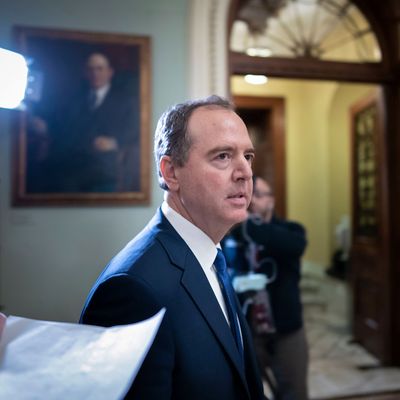
The last time Democrats tried to impeach Donald Trump, they wound up feeling … if not regret, then at least a sobering sense of anticlimax. When the deed was done, almost everybody agreed it had redounded to the benefit of its intended victim. Political scientist Carlo Invernizzi-Accetti warned in the the Guardian that impeachment would prove “politically counter-productive for Democrats.” Former Bush speechwriter Marc Thiessen proclaimed, “Trump supporters should give thanks that Democrats’ impeachment obsession is backfiring. Indeed, it could prove to be the biggest political blunder in modern times.” “It was about harming Trump in an election year. By that standard, it could not have gone worse,” gloated Mollie Hemingway. These opinions filtered down to the electorate. Reuters interviewed dozens of voters, finding “Republicans largely confident the impeachment process will backfire and Trump will win re-election. Democrats, on the other hand, are worried they may be right.”
But maybe, in retrospect, impeachment didn’t help Trump. Maybe he could have won the election if he hadn’t been impeached.
This is the thesis proposed by Mark Hemingway, a right-wing commentator (and husband of Mollie). The majority of Hemingway’s piece is given over to recapitulating a familiar list of the ways Democrats and the mainstream news media treated Mr. Trump very, very unfairly — by paraphrasing his phone call with Vlodomyr Zelensky, hiding the whistleblower’s identity, and so forth. But the novel part of his argument is that impeachment worked:
Biden’s razor-thin swing state victories might not have materialized if the Trump campaign had been able to gain traction from its October Surprise – a series of articles it helped orchestrate in the New York Post that reported information from a laptop owned by Hunter Biden suggesting corrupt foreign business deals that may have involved his father. …
Once the Post ran its first laptop article on Oct. 14, Democrats and their allies immediately turned to the narrative they had long used against Trump: foreign interference. Without evidence save for the claims of Democrat partisans and anonymous official sources – like those commonly relied upon during the debunked Trump-Russia affair – the New York Times, Washington Post, and Politico ran stories suggesting the laptop could be Russian disinformation. Joe Biden said the laptop was a “Russian plan” at the first presidential debate. The FBI, which was a main driver of the Trump-Russia collusion investigation, added to the narrative when word was leaked that the bureau was investigating whether the laptop emails were Russian disinformation. Twitter and Facebook reacted by actively censoring the Hunter Biden story. Twitter went so far as to lock the New York Post out of its own account.
Hemingway obviously considers the response to Trump’s use of Hunter Biden’s stolen laptop to be completely unfair. Rather than repeat those arguments, it’s worth putting aside the ethics of the situation and analyzing it from a tactical point of view.
From that standpoint, Hemingway’s argument seems quite solid. Before September, 2019, Rudy Giuliani had been working in Ukraine to pressure the government to give up information that he could use to make Joe Biden look corrupt. This wasn’t a secret. He was boasting about it in the New York Times. (“There’s nothing illegal about it. Somebody could say it’s improper,” he told the Times — on the record!) Giuliani’s partners in Ukraine were widely suspected to be linked to Russian intelligence.
But all this was just another Trump scandal sitting in plain sight, mostly deprived of oxygen by all the other Trump scandals. Trump and Giuliani probably understood that the potential for their work to scuff up Biden was much greater than its potential to harm them, for the simple reason that there was only so much incremental damage yet another Trump scandal could do, whereas Biden had a pretty clean image that could be seriously tarnished if they got the mainstream media to treat their allegations seriously.
But impeachment created a five-month-long national tutorial in Trump’s plans to force Ukraine to help his campaign. It even got large numbers of Republican officials to concede that his scheme to use his presidential authority to conscript Ukraine into his opposition research operations was bad (even if none of them save Mitt Romney thought it was bad enough to remove him from office.)
And so when Giuliani finally produced the October Surprise, the media had been well schooled. Reporters knew that Joe Biden had fired ineffectual Ukrainian prosecutor Viktor Shokin as part of an effort to clean the country up, rather than as a favor to his son. They knew Trump’s own cronies were engaged in the very scam (using their power to skim money out of the Ukrainian energy sector) they were accusing Biden of trying. The Treasury Department even felt compelled to identify Andrei Derkach, Giuliani’s partner, as an active Russian agent.
Would all of this have occurred without impeachment? Would any of it? Or would the press corps instead have magnified Trump’s insinuations, wondering aloud if Biden’s call to fire Shokin was fishy, and letting Trump’s cooperation with Russian agents just slide into the background?
There’s no way to know how the Biden story would have played out or what difference it would have made to the outcome. But the margin in the decisive states was very close, even if the national vote was not. Impeaching Donald Trump for the crime of using his office to smear Joe Biden might well have enabled Biden to beat him.






























